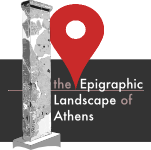Cf. Plu. Ant. 60, 6Plutarchus (testimonium)
Inv. number
Translations
AIO, AXON, IG Online
Images
Aleshire, Imaging Inscriptions, OSU Squeeze Collection, UBC Epigraphic Squeezes, ASCSA Net
Description
Date
39-31 BCE
Period: 1st century BCE --> second half
Reasons: historical context, prosopography
See notesCf. ELA id: 411.
The rededication of this statue to Antony certainly dates back to a moment following the visit of Antony and Octavia to Athens, when the two received many honours in the city, being also recognised as gods (see Ath.Agora 18 H273Geagan D., «The Athenian Agora XVIII. Inscriptions: The Dedicatory Monuments», Princeton 2009. = ELA id: 344; IG 2[2] 1043Inscriptiones Graecae II et III: Inscriptiones Atticae Euclidis anno posteriores (2nd ed., Pars I-III, Berlin 1913-1940; Pars V: Berlin 2008), Ed. J. Kirchner = ELA id: 245), and preceding the crushing defeat suffered by Antony at Actium.
Text category
honorific dedication (tabula honoraria)
✓overwriting
See notesHonorific dedication for Antony previously honouring Attalos I or II of Pergamon.
Monument description
Monument type: base
See notesThis inscription and colossus directly parallel the other imposing statue rededicated for Antony on the Acropolis (ELA id: 411), perhaps representing a heroic nudity. As well as in the other case, it was blown down by a storm a little before the Battle of Actium or, more likely, thrown down by the Athenians themselves after the news of the victory of Octavian reached the city.
Cf. also Kotsidu 2000 Kno. 32[L]Kotsidu H. (2000), «ΤΙΜΕ ΚΑΙ ΔΟΞΑ. Ehrungen für hellenistische Herrscher im griechischen Mutterland und in Kleinasien unter besonderer Breücksichtigung der archäologischen Denkmäler», Berlin 2000.
Physical features
Reuse: Apparently reused "in situ"
Findspot
Circumstances: literary source
Original location
Together with the other colossus, this statue may have also decorated the eastern sector of the Acropolis east or south-east of the Parthenon, as supposed by Di Cesare.
✓uncertain
See notesCf. Di Cesare in Krumeich - Witschel 2010 237-238Krumeich R., Witschel Ch. (hrsg.),«Die Akropolis von Athen im Hellenismus und in der römischer Kaiserzeit», Wiesbaden 2010.


